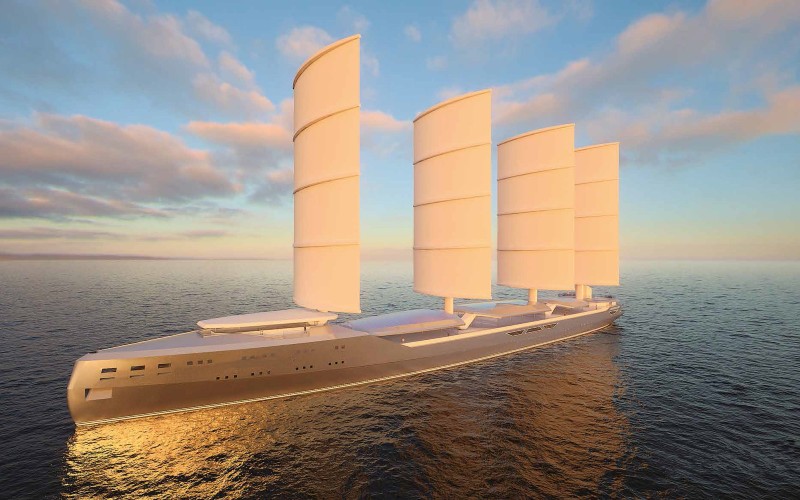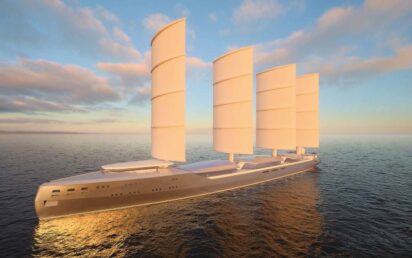A UK company is using satellite data to develop technology that will help the shipping industry reduce its CO2 emissions, and encourage the use of wind for powering ships.
90% of everything we consume is moved by sea, and as world trade continues to grow, there is an increasing number of ships crossing our oceans, each using vast amounts of energy.
The shipping industry is responsible for around 940 million tonnes of CO2 annually, which is at least 2.5% of the world’s total CO2 emissions. The International Maritime Organization has set a target for it to cut these emissions by 50% by 2050 and the UK Government is the first in the world to include emissions from international shipping in its domestic carbon budget.
To help the shipping industry rise to the greenhouse gases challenge, UK company, Smart Green Shipping (SGS), has developed a wind-assist power solution based on America’s Cup wingsails.
Its ‘FastRigs’ system involves a series of ‘smart’ vertical aerofoils mounted on vessels, which are paired with a sophisticated analysis system, that can accurately calculate the available wind to any ship, across any trade route at different speeds – aiming to reduce fuel consumption by at least a fifth initially and building on that as the technology progresses.
https://businesscloud.co.uk/maritime-leaders-urged-to-embrace-digitisation/
At the European Space Agency’s Business Incubation Centre UK (ESA BIC UK), SGS has been using meteorological and satellite technology to develop the prototype for this state-of-the-art digital software for this wingsail system.
This digital software can provide projected annual fuel savings accrued, whether that is through retrofitting the technology into an existing ship, or as part of a new-build design. This enables project partners to finance the greenhouse gas-saving technology.
It also makes the wingsails ‘intelligent’, sensing when to turn to make the most of the wind angle and speed, as well as retracting when approaching a bridge, or when wind speeds present a danger. It does all this autonomously meaning there is no need for any additional crew to operate.
The ESA BIC UK is part of the world’s largest business incubation programme for start-ups that are using space or satellite technologies to develop new products and services. Managed, and partly funded, by the Science and Technology Facilities Council (STFC), in collaboration with ESA Space Solutions, the UK Space Agency and the University of Leicester, it sets out to help small businesses develop game changing products and services for an increasingly competitive, global marketplace.
To date it has incubated nearly 100 start-up companies, and SGS is the latest company to have graduated from the programme after completing a two-year support programme.
https://businesscloud.co.uk/startup-raises-1-7m-to-digitise-construction-waste-tracking/
Diane Gilpin, Founder and CEO of Smart Green Shipping, said: “Wind is free, clean and abundantly available to ships that are equipped to harness it. Our modern wind-assist solutions are highly advanced and optimised to enable the shipping industry to start driving down emissions immediately.
“For SGS, the ESA BIC UK support over the last two years has been of key strategic importance to our mission, to drive the uptake of renewables in the maritime industry using wind power.
“The development of our digital tool is critical to our efforts to support ship owners assessing the commercial viability of installing wind-assist solutions on their ships.”
Dr Sue O’Hare, Operations Manager at the ESA BIC UK, said: “Combining satellite technology with wind power in a mission to reduce CO2 emissions in the global shipping industry is an inspirational example of how space can help address both our environmental and industrial challenges.
“I’m thrilled to have supported SGS in the development of such pioneering technology and wish it every success as it takes its business to the next level.”
The ESA BIC UK is a UK-wide programme, incorporating the Harwell Campus in Oxfordshire, Sci-Tech Daresbury in the North West, the Royal Observatory in Edinburgh and the new Space Park Leicester. Each location is firmly associated with world leading specialisms that companies joining the programme can benefit from.


